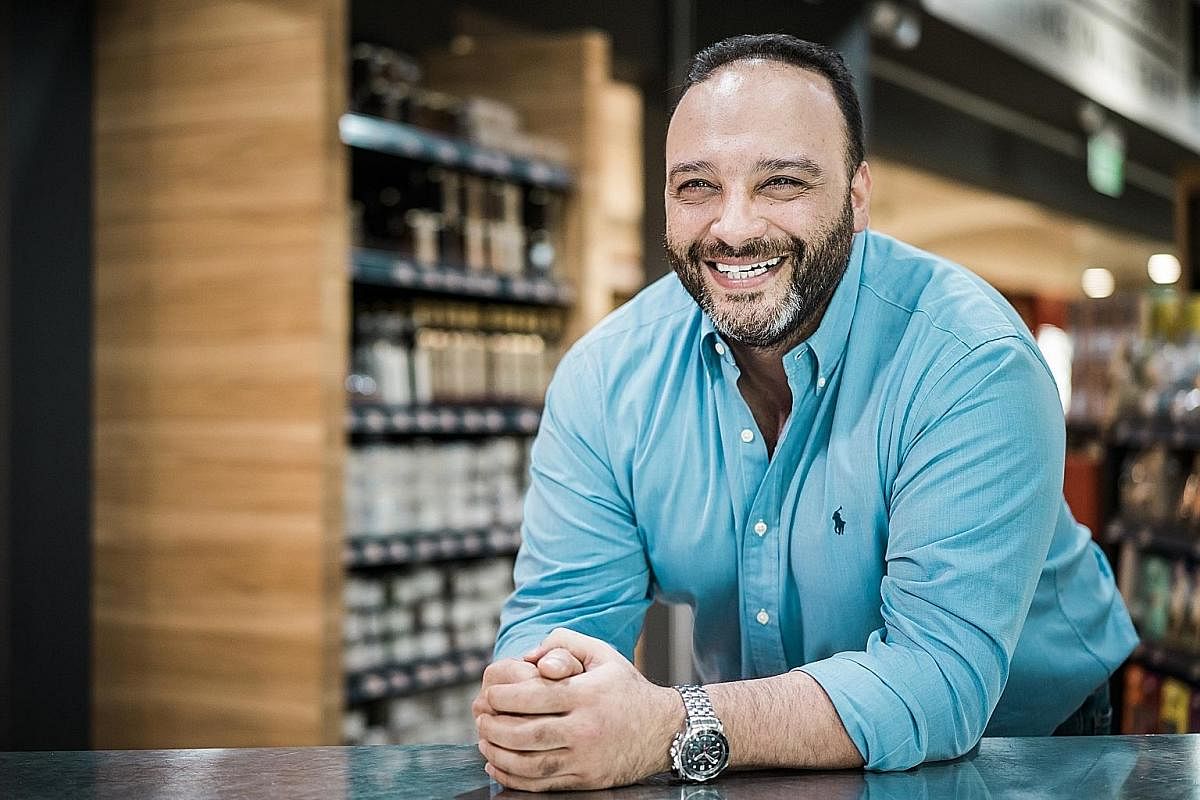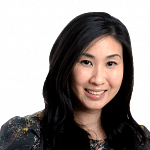-
WHAT WOULD YOUR LAST MEAL BE?
-
My mother's shish barak. It is a Lebanese version of ravioli filled with minced meat, cooked with yogurt. It is made by hand and the dish is slow-cooked for about six hours. I would also have to hunt down that fantastic spicy chilli chicken dish I had in London some time ago at a random takeaway joint.
Foodie Confidential
Little Farms is big on food
Mr Fred Moujalli, co-founder of grocery chain Little Farms, believes produce should be treated with respect

Who: Mr Fred Moujalli, 43, co-founder and head of operations at 21/2-year-old grocery chain Little Farms, which has outlets at Valley Point Shopping Centre in River Valley, United Square mall in Novena and Tanjong Pagar Centre.
A fourth outlet, a 2,000 sq ft grocery shop, will open in Holland Village at the end of the month.
Aside from offering fresh produce and a range of gourmet products, the stores also sell fresh deli and bakery items that include gluten-free options.
Mr Moujalli, who is from Sydney, is the former produce-buying manager for the now-defunct upscale chain of Thomas Dux grocery stores in Sydney and Melbourne, which were operated by retail giant Woolworths.
He moved to Singapore in 2015 to set up Little Farms.
Why did you think there was room in the market for another grocery shop?
We saw a gap in the market for fresh, high-quality and ethical produce.
Also, I could not buy a decent avocado here. They looked black on the outside - the skin turns a darker hue when ripe - but they were rock hard and that made me upset.
I later found out that a lot of the produce in the stores here came in via sea freight and because of the longer travel time, that meant the produce was not being picked at its best.
I knew then that I wanted to bring in the best avocados from Australia and they would have to be air-freighted.
Tell me more about the produce at Little Farms. Where is it from and how often does it come in?
Our produce comes in four days a week from Australia and twice a week from Europe.
We have buyers on the ground at Sydney Markets, the wholesale produce market in Sydney, and I know farmers in Australia with whom I had worked previously.
I have also visited farms in Britain and France.
What we bring in depends on the seasons and time of the year. Currently, about 70 per cent of our produce comes from Australia. But come October, that will increase to about 95 per cent.
On the meat front, our offerings include hormone-and antibiotic-free chicken from local farm Toh Thye San, as well as grass-fed, hormone-and antibiotic-free Cape Brim Beef from Tasmania.
When we opened in 2016, we had about 1,500 products. We have since increased our offerings to more than 2,600 products.
I have tried every single product in this store and, if I didn't believe in it, we wouldn't sell it.
We also sell ethically farmed fresh salmon from Australia. We started with 15kg a week. These days, we bring in and sell 90kg a week.
You have three stores, with another opening soon. What is your expansion strategy?
We used the first year to get our operations and processes right and made sure everything on the back-end was ready before we looked into expansion. We will probably open a few more stores in Singapore.
We want to be your local neighbourhood grocer, a "Whole Foods Market of Asia", albeit on a smaller scale. (Whole Foods Market is an American supermarket chain.)
That is why we decided to set up our stores in River Valley, Tanjong Pagar, Novena and, soon, Holland Village. They are centred on both residential and office communities.
The big chains can be sterile and, for us, it is all about the customers and creating an environment that keeps them coming back and a place where our staff are happy to work in.
You opened your first store at Valley Point in February 2016. What were some of the initial challenges?
During the first four months, it was predominantly expatriates who frequented our store and when the summer months hit, from June to August, it was a ghost town.
It is hard to change people's shopping habits - it takes six months. It took some time for locals to warm up to us, but as their confidence in us and our offerings increased, so did the amount of goods they put into their shopping baskets.
For example, our first order of chicken from Toh Thye San farm was just four packets of chicken thighs, six packets of chicken breasts and five whole chickens.
No one bought them and we had to throw the chicken away after three days.
These days, we sell a lot more chicken and are now one of Toh Thye San's bigger retail customers.
What is always in your fridge at home?
Lettuce, cucumber, bird's eye chillies, minced beef, salmon, chicken breast and lemons.
Being Lebanese, I love lemon, that citrusy flavour, on everything.
I eat steamed veggies - drizzled with garlic, lemon juice and olive oil - as a meal once a week.
Where are some of your favourite food haunts in Singapore and overseas?
I like Ronin, a cafe in Hongkong Street for the atmosphere. For good, authentic Lebanese fare here, I go to Kazbar in Church Street.
In Melbourne, I love Greek restaurant Gazi by celebrity chef George Calombaris and, in Sydney, my favourite haunts are Linea Cafe in Ramsgate and Kafe Neo in Kogarah.
In London, I like Mexican restaurant La Bodega Negra in Soho.
What is your secret indulgence?
Maggie Beer's Burnt Fig, Honeycomb and Caramel ice cream. I can sit and eat a whole tub of it. That, and a bar of dark chocolate.
Do you have a philosophy when it comes to produce?
Treat produce like your mother, with respect - it is written on one of our Little Farms T-shirts.
Abuse produce and it will die on you. You need to treat it with love because fresh produce is paramount - it is God's gift to us.
• Follow Rebecca Lynne Tan on Twitter @STrebeccatan
Join ST's Telegram channel and get the latest breaking news delivered to you.
A version of this article appeared in the print edition of The Sunday Times on August 05, 2018, with the headline Little Farms is big on food. Subscribe

